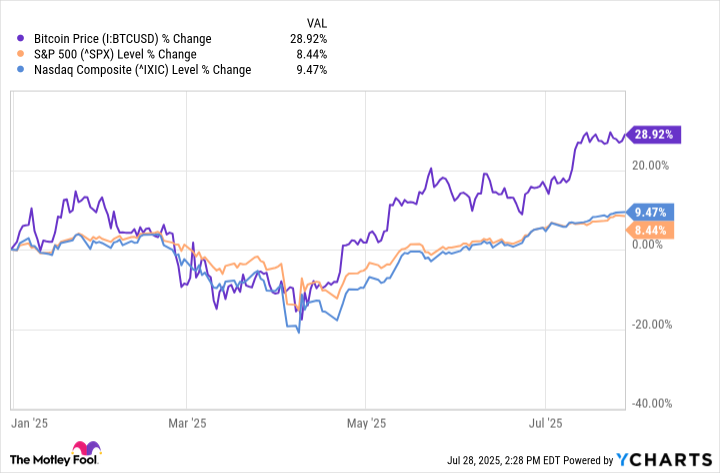One asset class that has garnered quite a bit of enthusiasm from investors this year is cryptocurrency. Similar to how much of the artificial intelligence (AI) movement can be traced back to a select group of winners (the "Magnificent Seven"), investors appear to be applying the same template to cryptocurrency.
Two of the most popular cryptocurrencies right now are Bitcoin and XRP (XRP 5.65%). As of this writing (July 28), Bitcoin's price of roughly $120,000 is hovering near all-time highs. Meanwhile, at only $3, XRP appears much more modest.
Let's explore what makes Bitcoin and XRP unique to help get a sense of the catalysts that are fueling their current price action. In the long run, could XRP emerge as the "next Bitcoin"? Read on to find out.

CRYPTO: XRP
Key Data Points
XRP could disrupt digital commerce as we know it, but...
More than 11,000 businesses and governments use the Society for Worldwide Interbank Financial Telecommunication (SWIFT) network as an intermediary to handle financial transactions. While SWIFT has major inroads in the global payments infrastructure, some would argue that it's an antiquated system. Often, settlement can take days, as various banks are usually involved in these transactions. As a result, transaction fees begin to accumulate for businesses.
Ripple offers a compelling alternative payments network for cross-border transactions. The Ripple network allows transactions to settle within seconds, and at a much lower cost compared to SWIFT.
One of the interesting advantages of Ripple is that its customers can use XRP as a bridge currency. Ripple's partner banks in various countries make the conversions to and from this cryptocurrency fast and seamless. This function removes the friction of dealing with banks using various currencies, and can soften the toll of foreign exchange fees.
According to data compiled by FXCintelligence, the total addressable market for cross-border transactions is expected to reach $320 trillion by 2032 -- up from $195 trillion in 2024.
Since XRP brings much-needed modern innovation to the payments infrastructure space, investors may see it as a potentially lucrative investment opportunity in the same light as Bitcoin. Let's explore how accurate that comparison really is.

Image source: Getty Images.
... does that make it the "next Bitcoin"?
So far this year, the price of Bitcoin has risen by 29% -- roughly triple the returns of the S&P 500 (^GSPC 2.06%) and Nasdaq Composite (^IXIC 2.39%).
Bitcoin Price data by YCharts.
I think that Bitcoin's price action throughout 2025 can be traced to a number of macro factors.
As far as Wall Street is concerned, spot Bitcoin ETFs have become increasingly adopted across institutions on Wall Street such as BlackRock and Cathie Wood's Ark Invest. In addition, a number of companies have started accumulating Bitcoin on their balance sheets -- essentially augmenting their liquidity positions through cryptocurrency.
Moreover, positive rhetoric from Capitol Hill surrounding the cryptocurrency landscape has fueled new legislation, such as the Guiding and Establishing National Innovation for U.S. Stablecoins (Genius) Act and the Digital Asset Market Clarity Act.
To be fair, though, some of these factors have served as tailwinds for XRP this year, too. So with that said, what really makes Bitcoin so unique?
Bitcoin's core qualities
Bitcoin has a capped supply of 21 million coins. As a result, there is a scarcity mentality that is applied when it comes to investing in Bitcoin. This is why Bitcoin is often referred to as digital gold. Generally speaking, the prices of desirable assets rise significantly when supply is limited.
While XRP has a fixed supply of 100 billion tokens, the scarcity psychology seen with Bitcoin doesn't seem to be present. I think there are a few reasons for this.
First, Ripple holds a portion of the XRP supply, meaning the token itself is not fully decentralized like Bitcoin is.
In addition, Ripple has been riddled with lawsuits from the Securities and Exchange Commission (SEC) in recent years. Although the worst appears to be behind it, there's likely a lingering negative perception among investors stemming from this situation.
Moreover, widespread adoption of Ripple doesn't necessarily equate to an accelerated use of XRP. Since Ripple already has an uphill battle competing with SWIFT and other established payment networks, it's likely that some investors simply don't think XRP will ever become a serious mainstream option in payments infrastructure.
With a market capitalization approaching $200 billion, XRP may look "cheap" at $3 per coin, but its market value is already more than several larger, more sophisticated fintech businesses -- suggesting that a lot of upside is already priced in.
While I see the advantages of XRP over legacy payment infrastructure, I do not think the cryptocurrency carries the same upside as Bitcoin.









